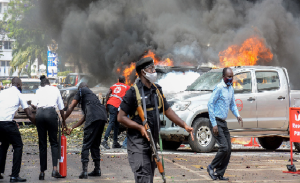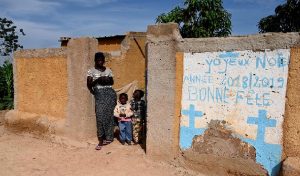25-09-2024
DAKAR: Having slipped undetected into Mali’s capital weeks ago, the jihadis struck just before dawn prayers. They killed dozens of students at an elite police training academy, stormed Bamako’s airport and set the presidential jet on fire.
The Sept. 17 attack was the most brazen since 2016 in a capital city in the Sahel, a vast arid region stretching across sub-Saharan Africa south of the Sahara Desert.
 It showed that jihadist groups with links to al Qaeda or Islamic State, whose largely rural insurgency has killed thousands of civilians and displaced millions in Burkina Faso, Mali and Niger, can also strike at the heart of power.
It showed that jihadist groups with links to al Qaeda or Islamic State, whose largely rural insurgency has killed thousands of civilians and displaced millions in Burkina Faso, Mali and Niger, can also strike at the heart of power.
Overshadowed by wars in Ukraine, the Middle East and Sudan, conflict in the Sahel rarely garners global headlines, yet it is contributing to a sharp rise in migration from the region towards Europe at a time when anti-immigrant far-right parties are on the rise and some EU states are tightening their borders.
According to the UN’s International Organization for Migration (IOM), the route to Europe with the steepest rise in numbers this year is via West African coastal nations to Spain’s Canary Islands.
IOM data shows the number of migrants arriving in Europe from Sahel countries (Burkina, Chad, Mali, Mauritania, Niger, Nigeria, Senegal) rose 62% to 17,300 in the first six months of 2024 from 10,700 a year earlier, a rise the UN and the IOM have blamed on conflict and climate change.
Fifteen diplomats and experts told Reuters the swathes of territory under jihadist control also risk becoming training grounds and Launchpad for more attacks on major cities such as Bamako, or neighboring states and Western targets, in the region or beyond.
Jihadi violence, especially the heavy toll it has taken on government troops, was a major factor in a wave of military coups since 2020 against Western-backed governments in Burkina Faso, Mali and Niger, the countries at the heart of the Sahel.
The military juntas that replaced them have since swapped French and US military assistance for Russians, mainly from Wagner’s mercenary outfit, but have continued to lose ground.
 “I don’t really see the regimes in Mali, Niger and Burkina holding on forever. Eventually one of them is going to fall or one of them is going to lose a substantial amount of territory, which Burkina Faso already has,” said Caleb Weiss, an editor at the Long War Journal and an expert on jihadist groups.
“I don’t really see the regimes in Mali, Niger and Burkina holding on forever. Eventually one of them is going to fall or one of them is going to lose a substantial amount of territory, which Burkina Faso already has,” said Caleb Weiss, an editor at the Long War Journal and an expert on jihadist groups.
“Then we’re dealing with a jihadi state or multiple jihadi states in the Sahel,” he said.
Western powers that previously invested in trying to beat back the jihadists have very little capacity left on the ground, especially since the junta in Niger last year ordered the US to leave a sprawling desert drone base in Agadez.
US troops and the Central Intelligence Agency (CIA) used drones to track jihadists and shared intelligence with allies such as the French, who launched air strikes against the militants, and West African armies but the Americans were booted out after they angered Niger’s coup leaders by refusing to share intelligence and warning them against working with the Russians. The US is still looking for a place to reposition its assets.
“Nobody else filled the gap of providing effective air surveillance or air support, so the jihadis are roaming freely in those three countries,” said Wassim Nasr, a senior research fellow at The Soufan Center, a think-tank in New York.
A media analysis of data from US crisis-monitoring group Armed Conflict Location & Event Data (ACLED) found that the number of violent events involving jihadi groups in Burkina Faso, Mali and Niger has almost doubled since 2021. (Int’l Monitoring Desk)
 Pressmediaofindia
Pressmediaofindia




